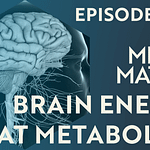Wide release date: May 15, 2025
Episode Summary: New research on how dietary fats, particularly omega-6 fatty acids like linoleic acid, influence triple-negative breast cancer progression by activating the mTOR pathway, a key regulator of cell growth. They explore the role of the FABP5 protein in enhancing cancer cells’ sensitivity to omega-6 fats, the differences between breast cancer subtypes, and the broader implications of dietary balance for health, emphasizing the need for personalized nutrition strategies.
About the guest: John Blenis, PhD is a Professor of Pharmacology and Associate Director of Basic Science at the Meyer Cancer Center at Weill Cornell Medicine. Nikos Koundouros, PhD is a postdoctoral fellow in Blenis’ lab, focusing on nutrient sensing in breast cancer.
Note: Podcast episodes are fully available to paid subscribers on the M&M Substack and everyone on YouTube. Partial versions are available elsewhere. Transcript and other information on Substack.
Key Conversation Points:
mTOR’s Role: mTOR pathway acts as a cellular “brain,” sensing nutrients like amino acids, glucose, and fats to regulate growth, but its dysregulation can drive cancer.
Omega-6 PUFAs & Cancer: High dietary omega-6 fatty acids, like linoleic acid found in seed oils, can fuel triple-negative breast cancer growth by activating mTOR, especially in cells with high FABP5 expression.
FABP5 as a Biomarker: FABP5, a lipid chaperone protein, is overexpressed in triple-negative breast cancer, making these tumors more sensitive to omega-6 fats, suggesting its potential as a therapeutic target.
Dietary Balance Matters: Modern diets with high omega-6 to omega-3 ratios disrupt inflammation balance, unlike historical 1:1 ratios, potentially increasing cancer risk.
Personalized Nutrition: Genetic variations and cancer subtypes highlight the need for tailored dietary recommendations, as blanket nutrition advice may not suit all patients.
Research Gaps: While omega-6 fats exacerbate existing triple-negative breast cancer, their role in initiating cancer remains unclear, requiring further study.
Broader Implications: High omega-6 intake may influence other cancers (e.g., prostate, colon) and chronic diseases like obesity, linked to FABP5 and inflammation.
Related episode:
M&M 200: Dietary Fats & Seed Oils in Inflammation, Colon Cancer & Chronic Disease | Tim Yeatman & Ganesh Halade
*Not medical advice.
Support M&M if you find value in this content.
Episode transcript below.
Episode Chapters:
00:00:00 Intro
00:03:15 mTOR Overview
00:11:40 Nutrient Sensing by mTOR
00:19:26 Breast Cancer Subtypes
00:27:07 Diet & Cancer Links
00:34:56 Essential Fatty Acids
00:43:16 Linoleic Acid Biochemistry
00:50:35 Study on Omega-6 & Breast Cancer
00:59:23 FABP5 & Omega-6 Sensitivity
01:08:30 Linoleic Acid & mTOR Interaction
01:15:50 Cause and Effect in Animal Models
01:23:48 Omega-3 Effects & Broader Implications
01:33:26 Clinical Studies & Nutrition Debates
01:41:59 Final Thoughts & Future Research
Full AI-generated transcript below. Beware of typos & mistranslations!
Listen to this episode with a 7-day free trial
Subscribe to Mind & Matter to listen to this post and get 7 days of free access to the full post archives.


















